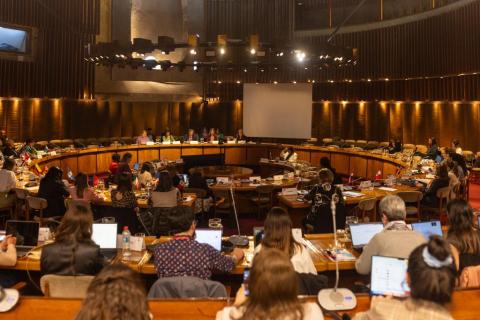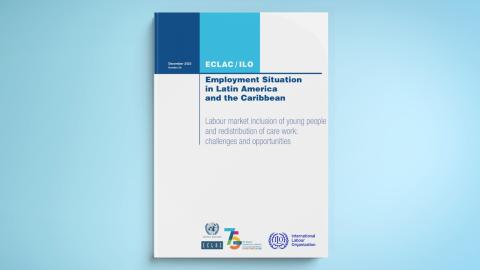Press Release
(8 March 2013) Conditional cash transfer programmes perpetuate society's organization of care around women's unpaid work, which is one of the causes of economic gender inequality, according to the third report from the Gender Equality Observatory for Latin America and the Caribbean: Cash transfers under the spotlight: contribution and burden for women.
Since they were introduced in the region, conditional transfer programmes mainly target women, as in most countries they provide income for children's health and education through their mothers.
Many such transfer programmes combine a cash transfer with a demand for family actions, and some have a sanctions system for failure to comply with contracted commitments (school attendance or health checks for children/adolescents).
According to the report, for many women these programmes represent their main form of stable income and provide a monthly allowance that they would not otherwise receive. Furthermore, women consider this cash benefit as their own, and in this sense it consolidates their position in household decision-making processes.
However, the study states that conditional transfer programmes portray women as mothers, not as people with their own rights to social protection, and this reinforces the socially constructed idea that care is a natural responsibility of women.
Alicia Bárcena, Executive Secretary of ECLAC, points out in the foreword that "public policies are far from assimilating the advancement of women and, although many programmes raise their profile and acknowledge them, the are generally not based on the rights framework, and the instrumental vision remains (especially of poor women)".
The study indicates that this type of social policy involves a maternalistic vision that sees women as jointly responsible (with the State) for achieving certain social objectives such as combating poverty. The individual responsibility of proving school attendance and health checks to receive cash transfers is placed above the State's responsibility to guarantee social services that enforce human rights to education and health for children and adolescents.
The study finds that conditional transfer programmes impose additional demands on women in terms of their time. Complying with the conditions requires more dedication on the part of women, who must process certificates for their children's school attendance and health checks.
In addition, the most common reason for transfers to cease is that children reach the maximum age for participating in the programme. This can be a problem for women, who can spend years receiving the cash transfers without generating alternative means of economic participation. When the income stops, they lose the benefit and may find themselves in a worse position than before for entering the labour market.
The publication includes several recommendations so that such programmes avoid reproducing the economic subordination of women, such as abandoning any maternalistic vision of social policy and amending programmes so that transfers help increase women's autonomy and contribute to changing traditional gender roles, rather than strengthening them.
The document also recommends strategies for moving from the concept of conditional transfer programmes to integrated, uniform, inclusive and rights-based social protection systems.
Advances in women's autonomy
This third report of the Gender Equality Observatory for Latin America and the Caribbean also reviews progress made in each of the following indicators analysed by the Observatory: physical autonomy, economic autonomy and decision-making autonomy.
In terms of women's physical autonomy, problems and inequalities remain. Although regional average maternal mortality has not progressed negatively, the situation remains worrying in 15 countries. While unmet demand for contraception is falling, teenage pregnancy is on the rise (especially among poor young women) as pregnancy in other age groups falls. In addition, violence against women is still a major problem in the region.
As for decision-making autonomy, recent years have seen an increase in female presidents and parliamentary representatives in the region (particularly over the past decade). In the judiciary, the increase has been much more recent and has occurred in a very small number of countries. This is considered positive because it smashes the glass ceiling that prevented women from accessing the most senior positions.
The analysis of women's economic autonomy highlights one of the most typical paradoxes of the region's economic and social development. While economic growth continues and poverty falls, the proportion of women among the poor and extremely poor is on the rise. What is more, the reduction in poverty is largely due to women entering the unregulated labour market, which pays them lower wages than men.
The Gender Equality Observatory for Latin America and the Caribbean was created by an inter-agency group made up of the UN Population Fund (UNFPA), the Pan-American Health Organization (PAHO), UN Entity for Gender Equality and the Empowerment of Women (UN Women), Ibero-American General Secretariat (SEGIB), Spain's cooperation agency (AECID) and the Spanish Ministry of Foreign Affairs and Cooperation. The Economic Commission for Latin America and the Caribbean (ECLAC) provides the secretariat.
Any queries should be sent to the ECLAC Public Information and Web Services Section.
E-mail: prensa@cepal.org; Telephone: (56 2) 2210 2040.
Follow us on: Twitter, Facebook, Flickr and YouTube.



